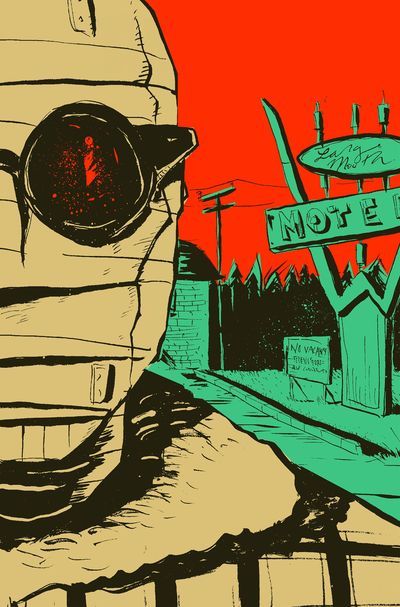by Jeff Lemire
Vertigo, $19.99.
Note: Spoilers lurk after the jump.
Let's get the niceties out of the way first. Jeff Lemire has a unique, idiosyncratic art style that is instantly recognizable and stands out clear and strong against the "Vertigo style" that has dominated a lot of that line's books in recent years. What's more, I like how he chooses to set his stories in rural, northern Canadian towns, an area that, let's face it, is rather underexposed in most comics these days.
All that having been said?
This really isn't a very good book. In fact, it's downright terrible in places, riddled with cliches and obvious in its themes to the point of irritation.
The book is basically a variation on H.G. Wells' sci-fi classic The Invisible Man. A strange man named Griffen, swathed in bandages from head to toe, arrives at the very small fishing village of Large Mouth. Everyone is naturally curious about him and his history, especially young Vickie, the daughter of the local restaurateur and seemingly the only teen-ager in the entire area.
Eventually Vickie and Griffen become friends -- H.G. Wells meets the Summer of My German Soldier. Griffen's hold on his sanity is precarious at best, however, and it isn't long before Griffen's sins not only come back to haunt him, but the residents' knee-jerk suspicions and prejudices overtake them and everything is quite literally shot to hell.
The biggest problem here is that Lemire doesn't have anything to say about small town life that haven't been said a million, trillion, quabillion times before. Every cliche is hit in the most grindingly obvious way. You say rural life can be a hotbed of racism, alienation, paranoia and angst? That your neighbors might be holding deep, dark secrets they're doing their damnedest to hide? That people will often use others as scapegoats to avoid facing their own inadequacies and faults? Don't stop the presses.
It doesn't help that a lot of these sequences come off as clumsy and hackneyed. Vickie and the rest of the town's denizens never come across as more than one-dimensional types and they really need to be a lot more for the story to be effective. Lemire tries to give the book some added heft by suggesting every so slightly that the whole "invisibility thing" might just be a figment of Griffen's fevered imagination but even that feels awkward and ham-fisted, like he's trying too hard.
Certainly Lemire is not without talent. There are a few graceful sequences here, particularily in his occasional uses of watercolor, in fact, I'd like to see him do more in that vein, as those panels have a looseness and softness that the rest of the book lacks. But the central problem isn't with Lemire's art, but in the fact that he's told a thoroughly unoriginal tale that drains the source material of its suspense and horror and trades it in for sentimentalism and trite moralizing. He can do better.


